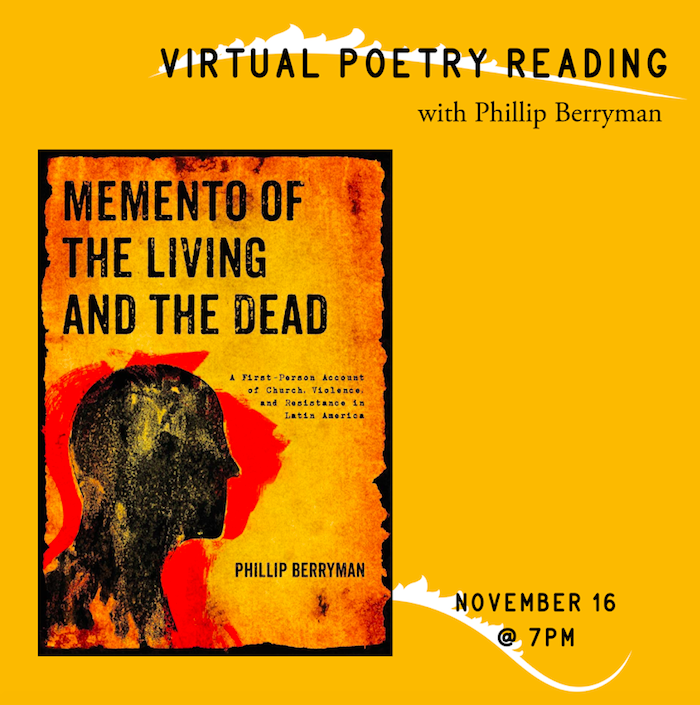Moonstone Presents:

- This event has passed.
Virtual Poetry Reading: Phillip Berryman
November 16, 2020 @ 7:00 pm

https://us02web.zoom.us/j/86344964528?pwd=d1BUUlN3N20yVk9WcU5LWHNsY2dGdz09
Meeting ID: 863 4496 4528, Passcode: 462706, Phone: +1 646-876-9923
El Salvador’s crisis of poverty and violence has remained the primal scene for liberation theology’s political assertion that the most vulnerable people pose a moral opportunity for organized religions. This year, we are remembering November 16th, the iconic anniversary of the 1989 massacre of six Jesuit Priests, their housekeeper and her daughter. The occasion honors the memory of Latin American clergy assassinated for their preaching against exploitation of poor people and draws together dramatic and traumatizing memories of the 1980 murder of Oscar Romero as well as nuns, Maura Clarke, Ida Ford, Ursuline Dorothy Kazel and lay missionary Jean Donovan, also killed in that year. The cause enunciated in this year’s celebration demonstrates special respect for lives and memories that are memorialized by the writing and lived experience of Phillip Berryman, author of Memento of the Living and the Dead, A First-Person Account of Church, Violence, and Resistance in Latin America ($33.00, Wipf and Stock Publishers).
In Memento of the Living and the Dead, Phillip Berryman relates his experiences as a Catholic priest in Panama City starting in 1965, and then, after leaving the priesthood to marry, in Central America in the late 1970s, as conflict and repression rose in Guatemala and El Salvador and the Sandinista revolution overthrew the Somoza dictatorship. Berryman was leading an ecumenical delegation in El Salvador when Archbishop Oscar Romero was murdered at the altar and was at the archbishop’s funeral when it was attacked. Under increasing surveillance in Guatemala, he and his family returned to the United States in 1980, where he took part in the movement against US interference in Central America. Through study, travel, and research in South America, he followed the emergence and evolution of liberation theology and the rise of evangelical Pentecostalism.
“With relentless honesty and humbleness, Berryman is always there just before something happens, liberation theology, revolutions in Central America, the end of communism, globalization, and a rising middle class. His focus is Latin America, but his observations carry over into an understanding of the world today . . . and tomorrow.”—June Carolyn Erlick, editor-in-chief, ReVista, the Harvard Review of Latin America
“For all of us who struggle for human rights—especially for the rights of the poor—whether in the United States or Central America, Berryman will remain a memorable ethical and spiritual reference point.” —Leonardo Boff, Brazilian theologian
Larry Robin, Host